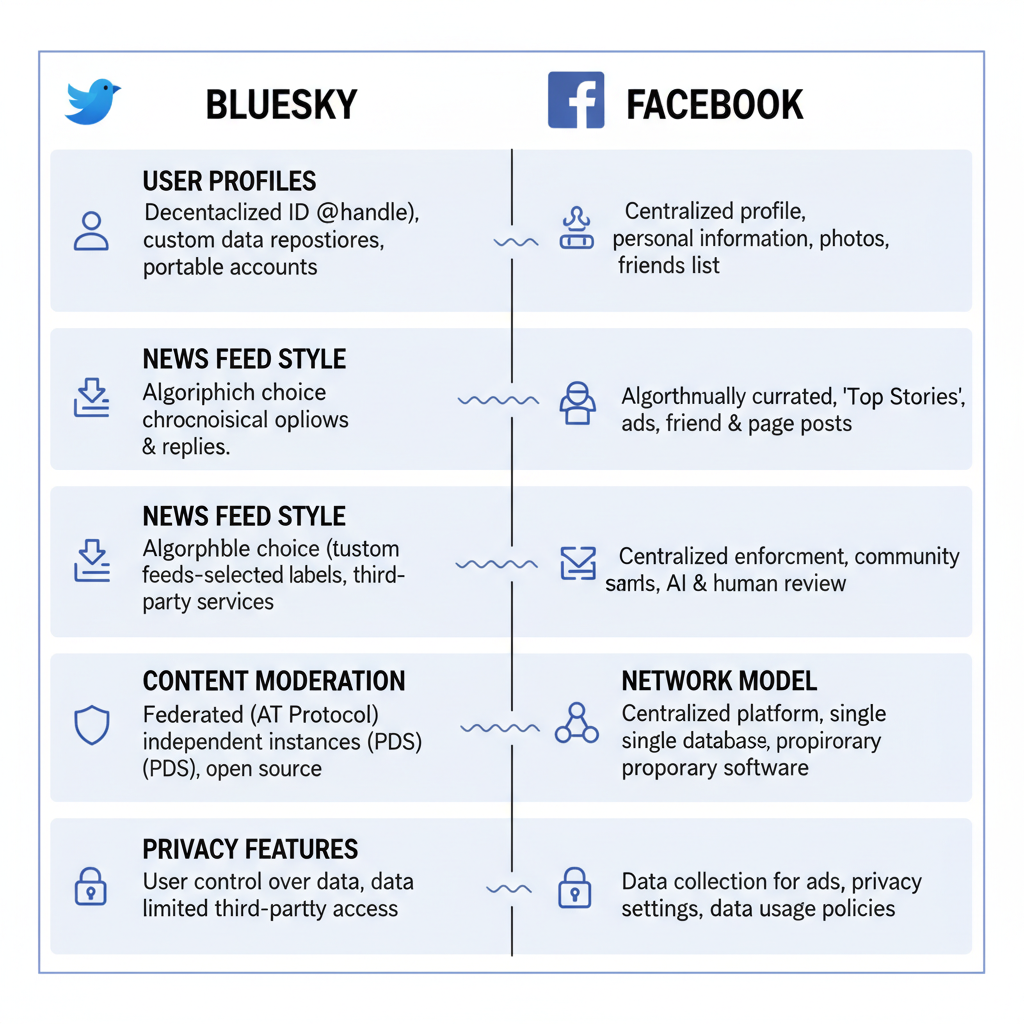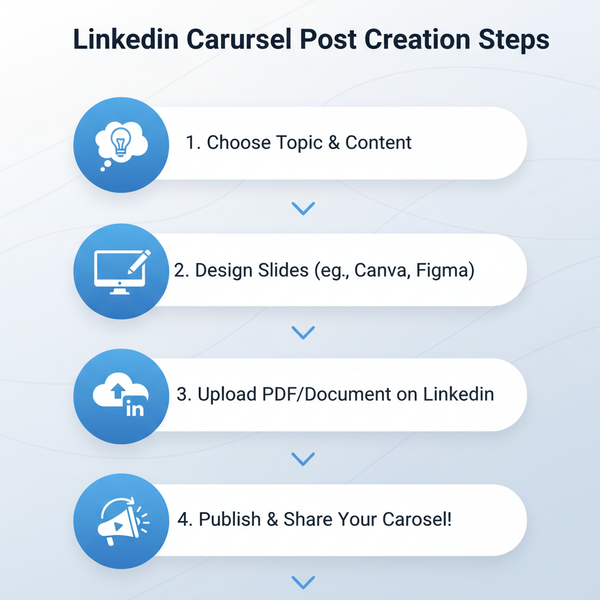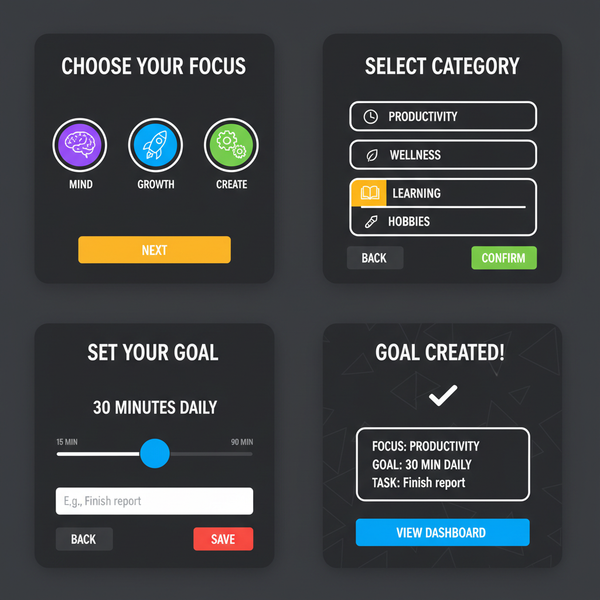Is Bluesky Like Facebook? Differences and Similarities
Explore the key differences and similarities between Bluesky and Facebook, from network models to privacy, moderation, and user experience.

Is Bluesky Like Facebook? Key Differences and Similarities Explained
Social media platforms shape how we connect, share, and engage online. Bluesky, a newcomer in the decentralized networking space, is sparking curiosity among users who ask: Is Bluesky like Facebook? Both platforms enable interaction through feeds, profiles, and posts, yet their designs, values, and business models diverge sharply.
This article compares Bluesky and Facebook in terms of mission, architecture, privacy, user experience, culture, and monetization—helping you decide which network fits your needs.
---
Introducing Bluesky: A New Decentralized Social Network
Bluesky is a decentralized social networking service launched in 2023 after years of development. Initially incubated by Twitter in 2019, Bluesky became independent, focusing on building the AT Protocol—an open, federated social media protocol.
Its mission is clear:
> To enable public conversations online without being locked into a single corporation’s control.
Instead of relying on a central server, Bluesky enables different servers (instances) to interconnect. This structure gives users ownership of their data, flexibility in moderation, and freedom to customize their online environment.

---
A Brief History of Facebook: Centralized Growth at Scale
Facebook was launched in 2004 by Mark Zuckerberg and fellow Harvard students, initially as a college-only network. By 2006, it opened to the general public. Over the years, it has become one of the largest social media platforms, with billions of monthly active users.
Its core business model revolves around targeted advertising, using user data and engagement metrics for precision marketing. Facebook operates under Meta Platforms, Inc., alongside Instagram and WhatsApp, forming part of a tightly integrated ecosystem.
---
Comparing Core Functionalities
Though Bluesky and Facebook look similar from a user’s perspective, their backend designs differ. Key overlapping features include:
- User Profiles: Bios, images, and chronological posts.
- Posts & Comments: Sharing text, images, and links, with others interacting through comments or reposts.
- Feeds: Central to both platforms, offering streams of updates.
These familiar interactions hide contrasting operational models—one built on decentralization, the other on centralized control.
---
Decentralized vs Centralized Network Models
Bluesky’s Decentralized Approach
- Runs on the AT Protocol, connecting multiple independent servers.
- Allows users to choose or create their own hosting environment.
- Supports data portability and server migration without losing connections.
Facebook’s Centralized Structure
- Operates on Meta’s proprietary infrastructure.
- Stores all data in Meta-controlled servers.
- Enforces universal moderation policies, feed designs, and monetization strategies.

---
Privacy, Data Control, and Content Moderation Compared
Privacy & Data Control
- Bluesky: Offers portable identities and control over content, reducing vendor lock-in.
- Facebook: Retains control of accounts; deleting content entirely is complex due to data retention policies.
Content Moderation
- Bluesky: Decentralized moderation at the server level, with flexible policy choices.
- Facebook: Centralized moderation using AI, human moderators, and a global policy framework.
---
User Experience: Design, Engagement Styles, and Algorithms
Bluesky’s interface echoes Twitter’s simplicity—short updates, chronological feeds, emphasis on conversation threads.
Feed Algorithms
- Bluesky: Offers customizable feeds, allowing a mix of chronological and curated streams from multiple sources.
- Facebook: Relies heavily on engagement-based algorithms, prioritizing posts intended to keep users active longer.
Engagement Styles
- Bluesky: Conversation-focused; open feeds with minimal additional services.
- Facebook: Wide feature range—groups, marketplace, events—encouraging diverse interaction modes.
---
Community Culture and Audience
Bluesky currently attracts a smaller user base: tech enthusiasts, journalists, and open-internet advocates.
Facebook hosts a vastly diverse global audience, spanning every demographic.
Tone
- Bluesky: Experimental, policy debates, niche humor.
- Facebook: Family updates, viral entertainment, professional networking, and local commerce.

---
Monetization Strategies
Facebook (Meta)
- Advertising: Personalized, targeted ads.
- Business tools: Sponsored posts, page promotions, marketplace listings.
Bluesky
- No ads at present.
- Exploring future options like paid server hosting or enhanced moderation services.
- Emphasis on community funding rather than ad-centric income.
---
Pros and Cons for Different User Needs
Bluesky Pros
- Strong data control.
- No ads currently.
- Customizable moderation.
Bluesky Cons
- Smaller network reach.
- Limited features beyond core posting.
- Technical skills useful for server management.
Facebook Pros
- Vast audience reach.
- Robust feature set.
- Established advertising tools for brands.
Facebook Cons
- Ongoing privacy concerns.
- Algorithmic control over visibility.
- Ad-heavy environment.
---
How Bluesky’s Open Protocol Could Influence Social Media
The AT Protocol’s open nature points to a future where:
- Platforms can interoperate seamlessly.
- Users switch hosting providers without losing contacts.
- Community governance enables faster innovation.
In contrast, Facebook’s walled-garden limits interoperability, keeping all user activity under Meta’s control.
---
Summary Table: Bluesky vs Facebook
| Feature | Bluesky | |
|---|---|---|
| Launch Year | 2023 | 2004 |
| Architecture | Decentralized (AT Protocol) | Centralized (Meta-owned) |
| Data Control | User-owned, portable | Company-controlled |
| Monetization | No ads (yet) | Targeted advertising |
| Community Size | Small, niche | Global, diverse |
| Feature Set | Basic social posting | Rich features: groups, events, marketplace |
| Moderation | Server-level, customizable | Centralized global policies |
---
Conclusion: Which Platform Fits You Best?
So, is Bluesky like Facebook? The answer: partially. While both connect people and enable social sharing, Bluesky’s decentralized, user-driven setup is fundamentally different from Facebook’s centralized, corporate-controlled ecosystem.
Choose Bluesky if:
- You prioritize ownership of your data and server choice.
- You want algorithmic control over your feed.
- You prefer tight-knit, innovation-friendly communities.
Choose Facebook if:
- You require global reach for personal or business needs.
- You use extensive social networking tools like events and groups.
- You appreciate a comprehensive platform with integrated services.
As Bluesky evolves, its open protocol could reshape the social media landscape, challenging giants like Facebook to consider interoperability. Now is the perfect time to assess your priorities and test-drive each platform to find your ideal online community.




